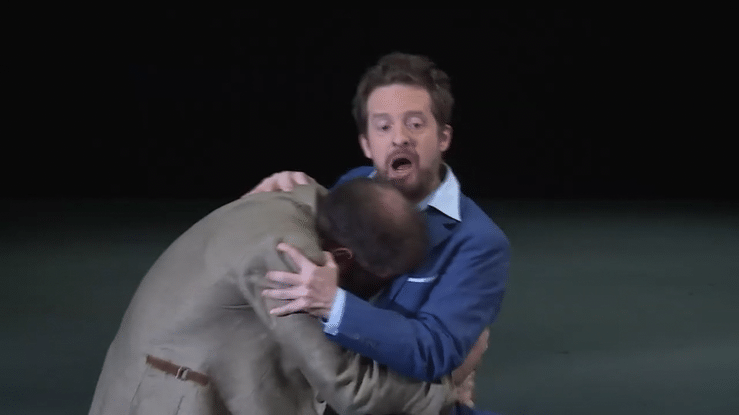
“Show stealing force”
— Washington Post
Andrew Foster-Williams has carved out a distinguished international career playing a wide range of operatic roles, each brought to life with vocal authority, dramatic insight, and stylistic finesse. His artistry is defined not only by the breadth of his repertoire but by the depth with which he inhabits each role whether villainous, noble, comedic or tragically complex.
As one of opera’s most formidable antagonists, his portrayal of Don Pizarro (Fidelio) at Theater an der Wien and Philharmonie de Paris brought his ability to channel menace with vocal precision to the fore, and his portrayals of Gunther in Pierre Audi’s acclaimed new Götterdämmerung and of Kurnewal in Ralf Pleger’s staging of Tristan und Isolde, both at La Monnaie and conducted by Alain Altinoglu, have demonstrated his ability to embody the dignity and inner conflict of Wagnerian figures.
He returns to ENO this season as Don Alfonso (Così fan tutte) in Phelim McDermott’s 1950’s “rollercoster of a production”, conducted by Dinis Sousa.


Equally compelling are his interpretations of roles that demand moral weight and emotional complexity. His Captain Balstrode (Peter Grimes) at Theater an der Wien and Opéra de Lyon was praised for its warmth and integrity. His Nick Shadow (The Rake’s Progress) at Opéra National de Lorraine was acclaimed for its fatal blending of charm and danger in equal measure, and as Lysiart (Euryanthe), also at Theater an der Wien, he added psychological tension to the opera’s romantic intrigue. Delving further into introspective territory, Foster-Williams’ portrayal of Golaud (Pelléas et Mélisande) at Theater Basel captured brooding jealousy and vulnerability.
Outside the opera house, Andrew Foster-Williams has built an impressive concert profile, and this season sees him in two of his signature pieces, Elgar’s The Dream of Gerontius, with Munich Philharmonic under Andrew Manze and Tampere Philharmonic conducted by Matthew Halls, and Brahms Ein deutsches Requiem with BBC National Orchestra of Wales with Hans Graf and with Andrew Manze conducting Polish National Radio Symphony. New pieces added to his repertoire this season include Sibelius Kullervo with Estonian National Symphony under Matthew Halls and Michael Haydn Requiem with Munich Philharmonic and Riccardo Minasi.

His recording of the The Dream of Gerontius with Paul McCreesh and the Gabrieli Consort and Players, released on Signum, has received widespread acclaim, winning the 2024 Gramophone Award for best recording in the choral category and the 2025 BBC Music Magazine Choral Award. Further credits include engagements with Cleveland Orchestra, San Francisco Symphony, Royal Concertgebouw Orchestra, and London Philharmonic.
Andrew Foster-Wiliams discography includes acclaimed recordings such as Beethoven’s Cantata on the Death of Emperor Joseph II and Haydn’s The Seasons, as well as award-winning contributions to the Opéra français series. His performances of Lysiart Euryanthe, The Fairy Queen for Glyndebourne, Mose In Egitto for Bregenz Festival, Deidamia from Amsterdam, and Brahms Ein deutsches Requiem were all captured on DVD, earning multiple Awards.

BEGINNINGS
It’s not only in film scripts that chance encounters change lives, for it was one such life-changing twist of fate that first set me on the road to becoming a singer.
As with many people, my first experience of music performance was at school. It was Gilbert & Sullivan’s The Gondoliers, and, at the tender age of 15, I must have been the youngest ever Grand Inquisitor!
In the audience that night was Roy Dillon, a highly respected local music teacher. After the show Roy came backstage to congratulate me and insisted that I should immediately begin music lessons. My parents were always incredibly emotionally supportive of whatever I wanted to achieve, but not in a million years could they have financially afforded such lessons, and at the time I had my mind set on becoming a mathematician. When I explained this to Roy, he told me that he believed so much in my talent and potential, he would teach me himself and that the lessons would be totally free of charge.
My curiosity took over, and that's how it all started. For half of each lesson we concentrated on singing practice and for the other half Roy taught me how to read music. Gradually mathematics was set aside, and music became my great passion.
One man's insight, and generosity of time and spirit, changed my entire life. Without it, I might never have known the complex beauty of singing a Bach Passion or a contemporary opera or the joyous excitement of playing such wonderful characters as Gunther in Götterdämmerung, Golaud in Pelléas et Mélisande, or Nick Shadow in The Rake's Progress. To be involved in the process of making such exquisite music is an immense pleasure and a great honour.

Shortly before I found out that I'd gained a place at the Royal Academy of Music in London - where I went on to spend six happy years - Roy died, at the tragically early age of 39, after an all too brief battle with cancer. He never got to know how his simple act of kindness so profoundly changed my life, but I’d like to think that his legacy is somewhere there in every single note I've sung since.
